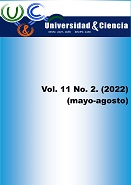ESCENARIOS BIOCLIMÁTICOS. REFLEXIONES PARA EL ENFRENTAMIENTO AL CAMBIO CLIMÁTICO / BIOCLIMATIC SCENARIOS. REFLECTIONS FOR DEALING WITH CLIMATE CHANGE
Keywords:
Bioescenarios, Modelación climática, PronósticoAbstract
Con el objetivo de reflexionar acerca de los escenarios bioclimáticos como descripciones coherentes y consistentes de cómo el sistema climático de la Tierra puede cambiar, y a partir de la información histórica y la generación de modelos físicos, matemáticos, estadísticos y/o geográficos, aproximarse al posible comportamiento que las variables climáticas tendrán en el futuro y sirva de utilidad en el planeamiento estratégico de políticas de control de las emisiones y de adaptación. Se desarrollan un grupo de acápites relacionados con la base teórica que permite comprender qué son los escenarios bioclimáticos, generalidades sobre la modelación del clima, origen e historia de los escenarios, su importancia y su aplicación, el sistema de modelación PERCIS, los tipos de escenarios de emisiones y que actividades serian útiles a partir de la aplicación de los mismos.
Downloads
References
BLANCA, E. (2010). Generación de escenarios de cambio climático, regionales y locales a partir de modelos globales - guía para tomadores de decisiones. Subdirección de Meteorología. Instituto de Hidrología, Meteorología y Estudios Ambientales – IDEAM Bogotá, Colombia.
CENTELLA, A.; BEZANILLA, A. y LESLIE, K. (2009). A Study of the Uncertainty in Future Caribbean Climate Using the PRECIS Regional Climate Model. Technical Report, Community Caribbean Climate Change Center, Belmopan,16 p.
CHRISTENSEN, H. … [et al.] (2006). Regional Climate Projections. In: Climate Change 2007: The Physical Science Basis. Contribution of Working Group I to the Fourth Assessment Report of the Intergovernmental Panel on Climate Change [Solomon, S., D. Qin, M. Manning, Z. Chen, M. Marquis, K.B. Averyt, M. Tignor and H.L. Miller (eds.)]. Cambridge University Press, Cambridge, United Kingdom and 32 New York, NY, USA.
FRIEDLINGSTEIN, P. … [et al.] (2006). Climate – carbon cycle feedback analysis: results from the C4MIP model intercomparison. Journal of climate. Vol.19, No. 14, pp. 3337-3353.
HULME, M. … [et al.] (2000). Using a Climate Scenario Generator for Vulnerability and Adaptation Assessments: MAGICC and SCENGEN Version 2.4 Workbook, Climatic Research Unit, Norwich, UK, 52 p.
IPCC (2000). The Intergovernmental Panel on Climate Change: SRES: Special Report on Emissions Scenarios. New York, USA.
IPCC (2007). Summary for Policymakers. In: Climate Change: The Physical Science Basis. Contribution of Working Group I to the Fourth Assessment Report of the Intergovernmental Panel on Climate Change [Solomon, S., D. Qin, M. Manning, Z. Chen, M. Marquis, K.B. Averyt, M.Tignor and H.L. Miller (Eds.)]. Cambridge University Press, Cambridge, United Kingdom and New York, NY, USA.
IPCC (2010). Escenarios de emisiones. Informe especial del Grupo de trabajo III del IPCC Publicado por el Grupo Intergubernamental de Expertos sobre el Cambio Climático ISBN: 92-9169-413-4.
IPCC (2014). Intergovernmental Panel Climate Change. Cambio climático: Informe de síntesis. Contribución de los Grupos de trabajo I, II y III al Quinto Informe de Evaluación del Grupo Intergubernamental de Expertos sobre el Cambio Climático [Equipo principal de redacción, R.K. Pachauri y L.A. Meyer (eds.)]. IPCC, Ginebra, Suiza, 157 p.
JENKINS, G y LOWE, J. (2003). Handling uncertainties in the UKCIP02 scenarios of climate chang Hadlen Center Tech Note 44. UK: Met Office.
JONES R. … [et al.] (2004). Generating high resolution climate change scenarios using PRECIS. Met Offrice Hadley Center, Exeter, UK, 40 p.
LAMICHHANE, J. … [et al.] (2014). Robust cropping systems to tackle pests under climate change. A review. Agron Sustain Dev. No. 35, pp. 443–459. doi:10.1007/s13593-014-0275-9.
MARENGO, J. … [et al.] (2009). Future change of temperature and precipitation extremes in South America as derived from 34 35 the PRECIS regional climate modeling system. Int J Climatol.DOI:10.1002/joc.
MEARNS, L. (2004). NARCCAP North American regional climate change assessment program A multiple AOGCM and RCM climate scenario project over North America. AGU Fall Meeting. 12/17/2004. San Francisco.
MEARNS, L. … [et al.] (2003). Guidelines for Use of Climate Scenarios Developed from Regional Climate Model Experiments, IPCC Task Group on Data and Scenario Support for Impact and Climate Analysis, 38 p.
MURPHY, J. … [et al.] (2004). Quantification of modelling uncertainties in a large ensemble of climate change simulations. Nature. No. 430, pp. 768–772.
RAISANEN, J. (2007). How reliable are climate models? Tellus A, Vol. 59, No. 1: p. 2.
RIVINGTON, M. … [et al.] (2008). Evaluating Regional Climate Model estimates against site-specific observed data in the UK. Climatic Change. Vol. 88, No. 2, pp.157–185.
RUIZ, F. (2007). Escenarios de Cambio Climático, Algunos Modelos y Resultados de Lluvia para Colombia Bajo el Escenario A1B. Nota técnica. Bogotá, Colombia: IDEAM.
SOLANO, O. (2016). Cambio climático y variabilidad del clima en Cuba. Algunos resultados científicos de interés agrario. Febrero 23-marzo 4, 2016 Varadero, Cuba.
TAYLOR, M. … [et al.]. (2013). The précis Caribbean Story: Lessons and Legacies. Bul. Am Meteorol. Soc. Vol. 94, No. 7, pp. 1065-1073.
WIGLEY, T. y RAPER, S. (1992). Implications for climate and sea level of revised IPCC emissions scenarios. Nature. No. 357, pp. 293-300.
WILBY, R. … [et al.] (2004). Guidelines for Use of Climate Scenarios Developed from Statistical Downscaling Methods, IPCC Task Group on Data and Scenario Support for Impact and Climate Analysis, 27 p.
Downloads
Published
Versions
- 2022-09-07 (2)
- 2022-05-15 (1)
How to Cite
Issue
Section
License
Copyright (c) 2022 Universidad & Ciencia

This work is licensed under a Creative Commons Attribution-NonCommercial-ShareAlike 4.0 International License.





















